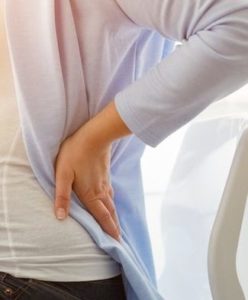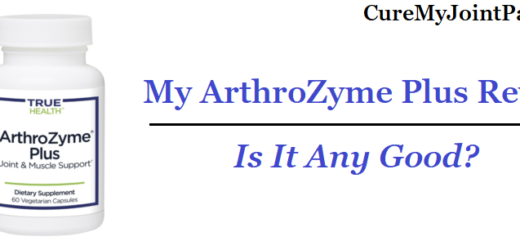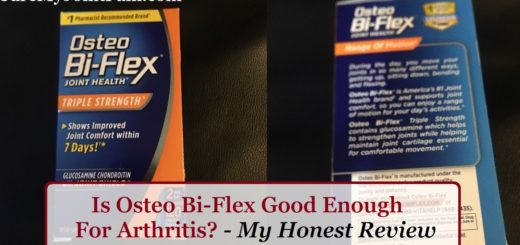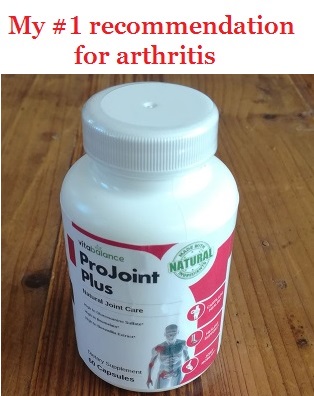7 Most Common Early Signs Of Hip Arthritis

Arthritis is one of the trickiest conditions in the world – it can come under a hundred shapes.
But there’s one type that can go unnoticed – hip arthritis. Why?
- it doesn’t have any clear symptom
- most of the times, it can go unnoticed
For this reason, here are the most common 7 early signs of hip arthritis.
If you have at least 2 of them – maybe you should consider seeing a doctor. The cause of your problems may be more severe than you think.
PS: See My Top 6 Remedies For Hip Pain Here
#1 – Stiffness In The Morning – And Not Only
This is probably the very first sign that there’s something wrong with your hip.
Sometimes morning stiffness appears long before the real pain – so there’s no warning sign.
But there is one problem with this symptom:
- it’s pretty normal after 70 (even without arthritis)
So how can you tell if your stiffness is caused by arthritis – or simply by age? Well, there are a few ways:
- If it’s just your hip feeling stiff, it’s probably arthritis
Age stiffness usually appears in hands or legs first. The cases when it only appears in the hips are pretty rare.
- If your hips feel stiff every time you get out of bed (during the day) or after any rest, it’s probably arthritis
Leisure stiffness is a common sign of this disease.
- If your stiffness goes away by itself after less than 15 minutes, it’s probably just because of your age
The stiffness from arthritis only goes away after 30 minutes or more.
#2 – Tenderness On Pressure
- Have you noticed that your hip is more sensitive to anything?
- Are you getting bruises in that area much easier than before?
- Or is it painful after any simple movement?
If the answer is yes, there is surely something wrong. And one of the possible causes may be arthritis.
You can see this symptom best if you apply some light pressure on your hip:
- You can do that either with your hand
- Or you can do it with a very light object
If you feel any small pain (and you shouldn’t, considering you’re pressing very light) – your hip is surely more sensitive.
And this usually happens when there’s some damage inside or when your hip is suffering.
There can be hundreds of reason for this. However, arthritis is among the most common ones – whether is osteoarthritis or an auto-immune form.
#3 – Pain…But Not The Common Pain
 Pain isn’t the top symptom in hip arthritis – because it doesn’t always come up first.
Pain isn’t the top symptom in hip arthritis – because it doesn’t always come up first.
In fact, more than half of the arthritis patients experience stiffness before the actual pain.
Unfortunately, they don’t take that as a symptom and think it’s normal.
What’s interesting about the pain is that usually it’s not your hip hurting. Most of the times, the pain is felt in other parts:
- groin
- thigh
- or even back
Sometimes hip arthritis can be confused with SI joint dysfunction, but fortunately there are a few differences.
The worse part is that most people have no idea that the problem is inside their hip. And the even worse part is that they rarely see a doctor.
Instead, they prefer to use local creams and lotions that are almost useless in this situation. They don’t treat the cause – so the relief is very short.
Therefore, if you ever experience pain near your hip, try to find out the cause as soon as possible. The problem may be in a place you never thought about.
#4 – Inability To Bent Down
Loss of flexibility is probably the most clear symptom of hip arthritis.
Once you can’t bend down properly, it’s clear that there’s something wrong.
But what’s causing it? It’s simple – the damage inside the joints. This symptom is more frequent in osteoarthritis, where the joints involved in movement are affected the most.
However, it can also appear in auto-immune arthritis, especially in more severe forms.
Stiffness is usually associated with this symptoms, and it makes sense.
Once your hips and back feel extremely stiff, you can’t control them properly. However, stiffness usually appears earlier.
When you lose your back flexibility and you can’t perform regular movements, your condition is already progress.
It may happen that you wake up one day with a very stiff back. It’s usually because of your sleeping position from the previous night, so it’s normal, it can happen to any of us.
But if this thing continues for more than 3 days, it’s pretty clear that it’s not the sleeping position.
#5 – Difficulty Walking
 This isn’t necessarily a very early sign of hip arthritis.
This isn’t necessarily a very early sign of hip arthritis.
Once your walking pattern is changed – we’re already talking about a progress of the disease.
Why does the walking become difficult? Well, it’s much more simple than you think – because of pain.
- The person can’t stand for a very long time
- So walking is even more difficult
If you have a severe form of this condition, you will start walking:
- slower
- with smaller steps
- you will probably need a walking stick
Stiffness could also play a role in this symptom. The stiffer your back, the more difficult your walking will be.
Obviously, your walking pattern won’t change overnight.
At first you will only get tired, then walk slower than you used to, and so on. Nothing will change suddenly, but if you don’t do anything, things could go out of control.
#6 – Weakness
This symptom also appears very early in patients with hip arthritis. But unfortunately, most of the times it goes unnoticed.
Once you have a very mild form of hip arthritis, your body will start getting tired easier.
This usually happens in rheumatoid arthritis – which is a condition that involves the whole body, not just the joints.
In this case, the fatigue you feel is general, not just local.
On the other hand, if you have osteoarthritis, you may not even have this symptoms.
At most, you could feel your lower back much weaker, but that is pretty hard to tell. If we were talking about hand or legs, it would be different, but in hips it’s pretty hard.
Now – don’t think about arthritis if you’re simply feeling a bit more tired and weaker. There are 99% chances that it’s another cause.
However, if you also have one or more of these symptoms, a medical consult could help you out.
#7 – Swelling
Here’s another sign that doesn’t appear in every type of arthritis.
In fact, swelling only appears when the joints are inflamed – so in auto-immune forms. You will almost never find inflammation in osteoarthritis.
When the joints around your hip are swollen, you may see it from the outside.
It’s not always possible – but if the inflammation is massive, your skin can get warm and red. It doesn’t always hurt, but it can feel very unpleasant.
However, if you notice this symptom once, don’t panic. You may have hit your hip unconsciously, though that’s pretty unlikely.
The real problems appear once your inflammation lasts for a few days and it doesn’t seem to go away by itself.
Or if it does, but it comes back after a while, there’s still a warning sign.
My Verdict – You Can Tell If You Have Hip Arthritis
No matter what form of arthritis you had, you will surely develop at least 2 of these symptoms.
They are earlier signs of hip arthritis, so they usually mean that your condition is still at the beginning.
It’s usually pain and stiffness, but it also depends of the kind of arthritis. Rheumatoid form comes with:
- swelling
- general fatigue
- you can also develop fever
On the other hand, the sign of osteoarthritis are a bit milder and more local.
But not matter what symptoms you have, it’s better to seek a doctor as soon as you can.
Don’t wait until your walking patterns starts to change, because that means your disease is making progresses. So the sooner you get a diagnosis, the better for your health.
Do you have any of these 7 early signs of hip arthritis? Let me know your answer in a comment and I will reach out to you with advice.





Thank you, Heather! Your article was very informative. For three years now I have been experiencing symptoms. At first it was a kind of resistance in the hips. Then there was fatigue and the usual things I did became harder. Last year I began to lose balance, needed to steady myself when I waledk and walked stiffly. I find it hard to climb stairs but going up ramps is harder. Sometimes my left leg just won’t move for a second or two. My thighs and arms have a dull ache all the time. I am only 54. My doctor says I probably have rheumatoid arthritis and wants to do tests when the symptoms become more specific. The statins I was taking for cholesterol exacerbated the pain but fortunately I am off it now. Is there anything I can do to slow down the symptoms? Thank you so much for your help.
Hi Gary, you are very young to be in so much pain. From what I understand, the pain you have is general (not just in one part of your body). So that might be a sign of RA, especially because OA usually appears after 60 and that’s not your case. Let me ask you some questions:
1. When you feel pain, does the painful area feel warm?
2. Do you have any inflammation or swollen joints?
3. Do you have morning stiffness – and how long does it last? It’s pretty normal for your joints to feel stiff when getting up, considering your issues. But if you also wake up with stiff joints, that’s a clear sign of a possible arthritis.
4. Are you taking any pain reliever currently? Or if you did in the past – what drug works best for your pain?
Now let me try to give you some solutions:
– I’m not very sure what kind of arthritis/joint pain you have, so until you answer those questions, I can’t recommend you any supplement.
– Certain foods can help pain, because they’re antioxidants and fight oxidative stress, which can worsen painful symptoms. On the other hand, there are some foods that can actually harm your body, so I advise you to try to avoid them.
– Turmeric can help a lot, if you have inflammatory pain. Supplements are normally my top recommendation, but in your case I won’t recommend that until I know more. Instead, there are some other ways to use it, both internally and externally.
– When your body feels really stiff and you can’t walk, try adding a heating pad or a hot bottle on the stiff part. That will make it go away within minutes.
Please answer the questions from above so that I can understand your problem better. Then I can give you further advice. Hope this helps.
love the way you come down to the nitty grity. I was told I have slight arthritis in spine & hips. at the time I felt no symptoms, I am a sprightly 69 yrs old. slowly my back started hurting and slight pain in hips. I also t ravel by bus 2-3hours to take care of elderly mother. I think that exacerbates my pain what do you think about that should I continue this routine,i go every Monday and travel back 2 1/4 hours.do you think I should will my back get worse if I continue.thank you for a reply judith strulovic be healthy and pain free
Hi Julie. From what I understood, you’re not doing anything uncommon, except for travelling weekly to your mother by bus. Do you travel 1 day/week (only Monday)? I personally don’t think that travelling by bus could be responsible for worsening your pain. After all, you’re basically sitting inside the bus, which should have comfortable seats. So I don’t really think this is the actual reason.
In fact, simply aging might be the reason why your pain is worsening. I don’t know if you’re taking any prescription for your arthritis right now – but if you don’t, my advice is to see your doctor and tell him about the worsening symptoms. At the time you were diagnosed, the condition was probably minor – but arthritis tends to worsen in time. That’s why seeing a doctor would be the best thing right now.
Additionally to the prescribed treatment, I can also recommend you a supplement. There are a few that helped my pain tremendously, but I’m not sure which would work best for you (because you didn’t mention what form of arthritis you have – is it OA?). Other than that, there are some other things that might help:
– make sure you eat lots of fresh foods and fruits/vegetables rich in antioxidants
– try to avoid humidity and rainy weather; a dry and hot climate is the best for your arthritis
– make sure you stay hydrated and drink enough water daily
– exercising can really help the pain; if you can’t run or exercise properly, you can try Yoga – as it’s a really easy form of physical activity
– this guide on treating arthritis naturally could give you more tips
Hope this helps.
Hi. I found your article really interesting and some of the comments very familiar. I’m 46 and have a little arthritis in my thumb joint which has worn the knuckle a bit. It’s responded really well to steroid injections and I have been pain free for about 2 years. However now I’m having difficulties with my hip. My hips have been achy for years with the odd ‘pinch’ but xrays were clear. Now I’ve got pain deep in my buttock and that side of my lower back. Bending down hurts and it feels like I’ve got a tight band around the joint with muscle spasms and buttock cramp which is interesting! Like one of the other comments going up stairs and ramps is uncomfortable. I’m seeing the GP next week but I’m nervous that the arthritis is taking hold. Any suggestions on things like glucosamine or cod liver oil or any other supplements? I’m not old enough for this yet!!
Forgot to mention – the arthritis in my thumb is OA not RA. I’ve been checked for RA and tests were negative. They called it just wear and tear.
Hi Annette. Your symptoms are typical for an early form of hip osteoarthritis: stiffness, difficulty moving, pain doesn’t have the same intensity in both hips, etc.
Considering your thumbs are already affected by OA, I’m pretty sure your hips are starting to develop the same kind of problem. But in my opinion, that’s not the worst thing that could happen – since OA can be kept under control (especially early forms). If you had RA for example, it would have been much harder to control.
So your GP might tell you about an early form of hip arthritis – but don’t panic! As I said, you can keep this problem under control with the right treatment. He will probably prescribe you some drugs to help. But if you want an additional advice, here are my recommendations.
1) In terms of supplements, you need something that will rebuild your hip cartilages. That’s what actually causes OA – cartilage tear. Now, the best substances for this problem are glucosamine + chondroitin. At this point, I don’t know anything better when it comes to repairing damaged cartilages.
My advice is to look for a supplements that contains glucosamine sulfate (the best form), chondroitin, MSM and some additional herbs like Boswellia, Turmeric, Bromelain (that’s an enzyme actually). Now – it’s glucosamine and chondroitin that do most of the job, the others only bring additional benefits.
ProJoint Plus is my top recommendation because it has the lowest price, but there are many other supplements that meet this criteria.
When it comes to fish oil supplements, I wouldn’t necessarily recommend them. Fish oil is a great anti-inflammatory, so it’s excellent in RA (which is caused by inflammation). But in OA, it’s not going to help tremendously – as there is little inflammation. Fish oil doesn’t really improve damaged cartilages, which is the main problem in OA. That’s why it’s not too helpful. And that’s available for most anti-inflammatory supplements (including Turmeric and Boswellia). They do help additionally, but supplements based on them won’t be too effective in OA. I hope you can understand what I mean.
2) I have an easy remedy for morning and sitting stiffness: heat. If you have a heating pad at home, you can use it. If not, a hot water bottle will do. Basically – every time your hips feel stiff or you have a hard time moving around, try to apply some heat and you should get (partially) better within minutes. Heat doesn’t really decrease pain, but it’s really helpful for stiffness. Cayenne pepper patches can also help, since they’re based on heating the painful area. Basically, all that has to do with heat is helpful for stiffness. That’s why a hot climate is much better for arthritis than a colder one.
3) This guide on treating OA naturally contains several tips and advice that might help.
4) Make sure you drink plenty of water and avoid getting dehydrated. That can worsen your actual pain and decrease joint lubrication, which you really don’t want to. Also, avoid alcohol of any type, because it also dehydrates the joints. When it comes to coffee, that’s not necessary.
5) Oil massage can also help with pain. Apply any kind of oil on the painful spot, massage and let it sit. In a few minutes, your stiffness should decrease even a bit. I recommend you to heat up the oil to get faster results. As I said, any kind of oil would do – whether it’s Olive or CBD Oil.
These are all the advice that comes in my mind right now. Please let me know what your doctor tells next week and what kind of treatment he prescribes. Hope this helps.
Thankyou so much. That’s all really helpful and I will be looking at glucosamine when I go out. I’m already using hot water bottles — I find them really comforting for my aches. Yes I’ll let you know what my GP says next week, thanks again. Xx
You’re more than welcome! I’m waiting for your update.
So I saw the nurse practitioner today who suspects I’m having a flare up either in my hip or lumbosacral spine. So I’m being referred for an MRI. Then she will arrange a steroid injection if I need one and some physio dependent on results. So I feel I’m being well looked after!
Hi Annette, I’m glad to hear this. Keep me updated with how things go.